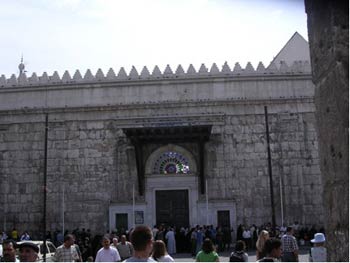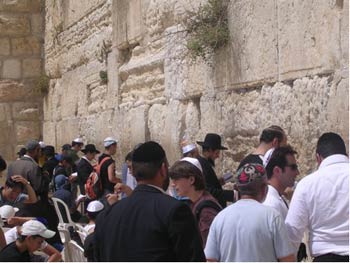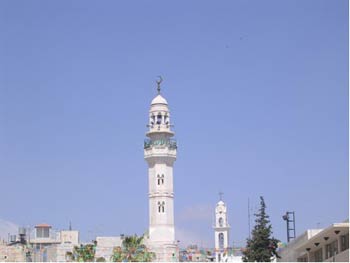“Now we hope that none of you will be slain but we wish you to know that the Kingdom of Heaven will be given as a reward to those who shall be killed in this war [against Muslims].” (Pope Leo IV, 9th century CE)
“The martyr [referring to suicide bombers], if he meets Allah, is forgiven his first drop of blood; he’s saved from the grave’s confines; he sees his seat in heaven; he’s saved from judgment day; he’s given seventy-two dark-eyed women; he’s an advocate for seventy members of his family.” (Sheikh Isma’il al-Adwan, 2001 CE)
Astonishing statements aren’t they? Or, are they?
I had an opportunity this past summer to take a remarkable trip to the Middle East in the company of a group of Christian seminarians. It was a 3 week seminar led by a university professor to expose the seminarians to the “Holy Lands,” and to the cultures and religions of the region. We traveled through Syria, Jordan, Egypt, Israel, the West Bank and Greece. The trip was remarkable both at the level of the countries and peoples that I met but also at the level of the intensive 3 week contact with devout future ministers of diverse Christian faiths. The experience also brought me to a more personal exploration of prejudice, a topic that was examined at an IPI conference in Salt Lake City and became the subject of a book, The Future of Prejudice: Psychoanalysis and the Prevention of Prejudice (2007). In this blog, I will present my personal reflections and raise some questions that I hope our on-line community will discuss.
In the interests of fair disclosure, my reflections are influenced by my own spiritual orientation. I was raised Catholic, but haven’t been part of organized religion since my 20s.
FAITH
My fellow travelers’ faith in Jesus Christ was a powerful part of the experience. There are considerable differences among them over whether Jesus was A WAY or THE WAY or THE ONLY WAY. I found the depth and diversity of their faith to be very moving. Faith is central to their lives and to their loving
There were many instances of faith and devotion among other people and other faiths as well. In Damascus we saw numerous Shiite pilgrims. Many had made great sacrifices to come from Iran to the Umayyad Mosque to pray and to affirm their faith. This was especially affecting in the mosque’s shrine to the martyr, Hussein. We also saw the devotion of Muslims in their 5 calls to prayer each day.



Yet, despite all of the powerful indications of love, faith and piety, the Middle East is such a blood-soaked land: fought over for thousands of years, continuing into today and, certainly, into tomorrow. Much of the violence has been in the name of religion – in the name of faith and love. We can argue that religion has been hijacked in the service of base motivations or that extremists have perverted the Word of God, but the evidence is clear that religion has been a force here (and elsewhere) that supports violence.
Witness the many instances in the world of this disturbing fact: Christian vs. Muslim, Christian vs. Jew, Catholic vs. Protestant, Sunni vs. Shiite, Jew vs. Muslim, Hindu vs. Muslim – to cite a partial list. And, of course we’re all too familiar with the terms Holy War and Jihad.
To put it succinctly, I left the trip being confronted with religion as embodying some of the absolute best and absolute worst of being human. It is a force that brings us together, connects us with the oneness of humanity and helps us care for one another. Also, religion is a force that divides us and promotes prejudice and violence.
PREJUDICE: 4 SIMPLE PRINCIPLES
1. PREJUDICE IN ITS MOST BASIC FORM IS PRE-JUDGMENT. This is a problem if we confidently keep that judgment in the face of our own ignorance or in the face of conflicting evidence. Carlo Strenger, an Israeli psychoanalyst writes, “prejudice is the maintenance of beliefs about an individual or a group without taking into account available evidence.” A prejudiced person is, as the saying goes, “Frequently wrong but never in doubt.”
2. I’M PREJUDICED, YOU’RE PREJUDICED, EVERYONE IS. Usually, when prejudice is discussed it’s easy for people to passionately agree that other people are prejudiced and “isn’t that just awful?” Then nothing much happens, except we can unite around our prejudice against those bad prejudiced OTHER people! But, if we look at the uncomfortable fact of prejudice in ourselves then that permits us to do something about it. We have a chance to accept the common humanity we share with other prejudiced people and to be open to the possibility of some transformation.
3. WE’RE ALL PREJUDICED BECAUSE IT COMES WITH BEING HUMAN. In normal development, at about 8 months, babies develop Stranger Anxiety. At this age, the infant perceives people outside of the family as DIFFERENT and becomes afraid of them. This is adaptive for a variety of reasons (e.g., emotionally knowing who the safe caregiver is vs. the relatively unsafe non-caregiver) but it also is the precursor of fear of difference. Consider that humans are predisposed to fear differences in others or, put another way, to fear others who are different from us. Also, I would suggest that we OFTEN HATE THOSE WE FEAR.
4. WE’RE ALSO FREQUENTLY PREJUDICED BECAUSE WE’RE TAUGHT TO BE by our parents, teachers and other people we respect (perhaps as a way that they unconsciously manage fear and difference). For example, I was surprised to learn from more than one seminarian that they were taught that Catholics aren’t Christian. Given the obvious denial of history this belief suggests, this is clearly a prejudice. The teaching of prejudice doesn’t have to be very explicit, either. It can be subtle and covert.
Simple prejudice can develop into malignant prejudice –malicious, humiliating violent, and discriminating behavior — through a variety of factors including overwhelming fear, hatred, emotional trauma and neglectful, abusive or otherwise inadequate parenting.
QUESTIONS
In a subsequent blog, I’ll write about issues of personal identity and the phenomenon of “them vs. us”. I invite you to discuss the following as well as whatever else was stimulated by this blog:
How does your religious/spiritual orientation inform your work as a psychotherapist?
What do you see as the relationship between religion and psychotherapy?
What do you see as the best and worst of religion?
What do you see as the connections between prejudice and faith?
What are your own experiences?

